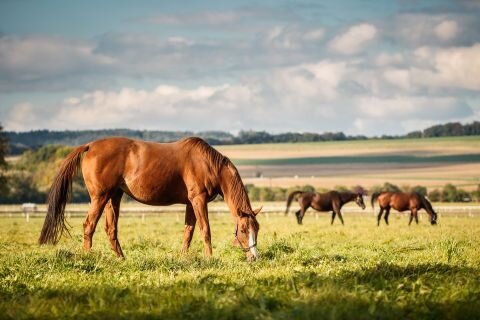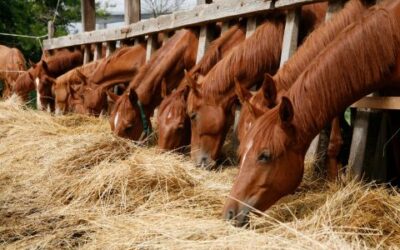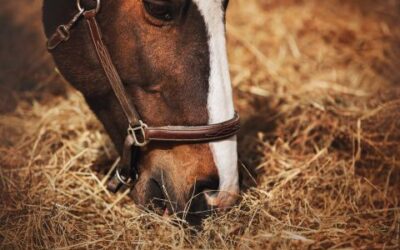
For horse owners, understanding the delicate dance between diet and digestive health is paramount. A horse’s digestive system, unlike our own, thrives on a steady stream of high-fiber forage, and the quality and quantity of this forage has a profound impact on their overall well-being. In this post, we’ll delve into the fascinating world of equine digestion, explore the magic of forage, and discover how to create a diet that keeps your horse happy and healthy from the inside out.
Built to Graze: The Equine Digestive System Demystified
Horses are hindgut fermenters, meaning the majority of nutrient absorption and energy production occurs in the large intestine, specifically the cecum and colon. Unlike humans with our single stomach, horses have a small stomach that acts more as a waystation for food. This unique digestive system evolved to allow horses to graze continuously on forages throughout the day.
Here’s where the magic happens: the large intestine plays host to a thriving community of microbes – bacteria, fungi, and protozoa – collectively known as the gut microbiome. These tiny organisms are essential for breaking down the complex fibers in forage, transforming them into volatile fatty acids (VFAs) – the primary energy source for horses. The gut microbiome also plays a crucial role in synthesizing essential B vitamins and amino acids, aiding in digestion, and supporting the immune system.
The Power of Forage: Fueling the Microbiome
Forage, which includes grasses, hays, legumes, and pasture, is the cornerstone of a healthy equine diet. Here’s why:
- Fiber for Fermentation: The high fiber content in forage provides the fuel – cellulose and other complex carbohydrates – that gut microbes need to thrive and produce VFAs. A steady supply of fiber keeps the digestive system moving smoothly and prevents digestive issues like colic and impaction.
- Slow and Steady Wins the Race: Unlike grains that are quickly digested, forage breaks down slowly, releasing energy consistently throughout the day. This helps maintain a healthy blood sugar balance and prevents the spikes and crashes that can lead to behavioral problems.
- A Symphony of Nutrients: High-quality forage (high-fiber horse feed) provides essential vitamins, minerals, and antioxidants that support overall health and well-being.
By paying attention to these needs, horse owners can ensure a positive impact of forage on gut health.
Choosing the Right Forage
Not all forages are created equal. Here are some factors to consider when selecting forage for your horse:
- Species: Different horse breeds have varying forage needs. Consider your horse’s age, activity level, and any health concerns.
- Maturity: Younger horses and pregnant or lactating mares may require richer forages like alfalfa, while mature horses might do well on grass hays.
- Quality: Look for fresh, dust-free forage with good color and aroma. Avoid moldy or musty hay.
Knowing how specific animals experience the relationship between forage and gut health is key to keeping them happy and healthy throughout their lives.
Beyond the Bale: A Balanced Approach
While forage is the foundation of a healthy equine diet, some horses may require additional nutrients in the form of concentrates (grains) to meet their energy demands. The key is to find the right balance. Concentrates should be fed in moderation, and never replace the majority of your horse’s diet with forage. No matter what, be sure to account for the connection between forage and gut health when choosing food for your animals.
A Recipe for Success
By prioritizing high-quality forage in your horse’s diet, you’re not just providing sustenance, you’re nurturing a thriving gut microbiome – the cornerstone of equine health. Remember, consult your veterinarian for guidance on creating a personalized diet that meets your horse’s specific needs. Consider the impact of specific activities and habits when making decisions. With a focus on forage and a commitment to gut health, you can ensure your horse has a long and happy life by your side.




